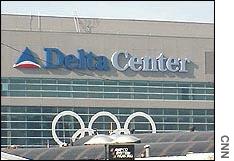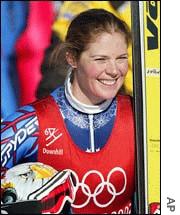|
Olympics' no-name sponsors
|
 |
February 15, 2002: 4:50 p.m. ET
Some wonder how long Olympics' limits on sponsors' names at venues will last.
By Staff Writer Chris Isidore
|
SALT LAKE CITY (CNN/Money) - The Delta Center, home of the Utah Jazz basketball team, disappeared from downtown Salt Lake City about a week ago. It is due to reappear in about another week.
In the meantime the 19,911-seat arena has been replaced by the Salt Lake Ice Palace, host to Olympic figure staking and short-track speed skating competition.
Of course, the building itself hasn't really moved or even changed significantly. The signs in downtown Salt Lake City still point to the Delta Center rather than the Ice Palace, and the name of the city's major air carrier still adorns the outside of the building.
But Olympic rules prohibit venues from having the names of sponsors or other corporations, and advertising signage can not be visible within the facility.

|
|
|
The Delta Center officially changed its name for the Olympics, although Delta Air Lines kept its name on the building. | |
Delta Air Lines is the official airline of the 2002 Winter Games, but that wasn't enough for it to keep its name on the building, even though it paid $25 million for 20 years of naming rights in 1991, about four years before the city won the right to host the games.
The International Olympic Committee isn't shy about seeking corporate money to help support one of its games every two years. Sponsorship revenue for these games has reached a record $840 million, according to the IOC figures, up from $633 million at the 1996 Summer Olympics in Atlanta and up from only $30 million raised for the 1980 Winter Olympics in Lake Placid, N.Y., the last time these games were held in the United States.
Still, some wonder how long the Olympics will leave an estimated tens of millions of sponsorship dollars per Olympics on the table by keeping such a ban in place. Games that used to celebrate only amateur athletes now allow competition by millionaire professionals. Some say it is not a much further leap to allow some signage to creep into the venues in future games.
"My gut says that eventually it could happen, said Dan Gacetta, Olympic marketing director for Octagon, a Washington, D.C.-based sports marketing company. "That's having seen what's happened in most other sports. If you just look at baseball for example, you didn't use to have signage on the outfield walls. Now you do."
Others involved in marketing around the Olympics wonder if the spread of signs or sponsors' logos would reduce the value of the sponsorship that is being paid for in the first place.
"One of the things you're buying into is the Olympic ideals," said Gary Pluchino, senior vice president for Momentum, a firm which helps arrange Olympic sponsorship deals. "One of the things that makes the Olympics special in the public view is the noncommercial nature of the venue and the events. That's a powerful platform for a company. I don't see that (signage and sale of venue naming rights) happening."
But others question whether those noncommercial ideals are still viable in this age of extensive sponsorship programs.
"That myth has been broken long ago," said Marc Ganis, president of sports marketing firm SportsCorp Ltd. "Everyone who follows the Olympics knows commercialism and corporate sponsorship is as much a part of the Olympics at this point as athletic competition. It is simply aesthetics, it is simply a veneer."

|
|
|
U.S. skier Picabo Street, whose fans can see the name of the equipment she uses in the Olympics. | |
Still Ganis agrees that, at least for the short-term, he doesn't expect the International Olympic Committee to change its policy. There could be conflicts on naming rights for existing facilities, such as the Delta Center in this case. And the IOC isn't facing the kind of economic pressure that could lead it to change its rules, said Ganis.
"They are a cash machine. They print money," said Ganis. "While there is no revenue pressure, they'll try to keep certain things pristine."
Some corporate names can be seen by Olympic spectators, especially television viewers. Athletes are allowed to use equipment and wear apparel which includes the name of the company that makes it, although there are strict rules on the size of the name.
For athletes who need sponsorship dollars during training, the ability to have those names visible helps them secure those agreements.
"Without that, they would have very few sponsors," said Bob Williams President of Burns Sports & Celebrities, which handles athlete endorsements. "It's key to those sponsors and that's why those sports and those athletes are getting the money." 
|
|
|
|
|
|

|

